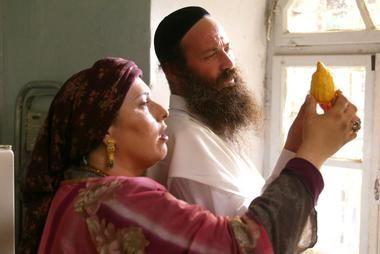
This Israeli-made film, the first collaborative effort between Israel’s religious and secular communities, is a small gem of a film. This film takes us into a world we haven’t seen before on film, inside an Orthodox Jewish neighborhood in Jerusalem.
Here a married couple, Moshe and Mali, are preparing for the Jewish harvest holiday of Succoth. However, though they are religiously devout and devoted to each other, they are impoverished and in need of some miracles. First, they need money to purchase a “sukkot,” which is a temporary dwelling place in which tradition dictates that Jews are to live during the Succoth holiday, in order to learn to depend on God’s provision. Then, they are to receive guests (ushpizin) to practice the charity of hospitality, but this couple has no one to share their sukkot with. Finally, they are praying for the miracle of a child.
Then, their prayers begin to be answered: Moshe is given an unexpected monetary gift, a friend gives Moshe a sukkot that he claims has been abandoned, and two visitors arrive out of the blue, one of them an old friend of Moshe. But what Moshe and his wife see as blessing, quickly turns into trials: the circumstances under which he received the sukkot are called into question, and the visitors, unbeknownst to Moshe or his wife, are actually escaped convicts. These uzpishin test Moshe’s memories of his pre-religious past, his patience, his marriage, his relationships with his strictly religious neighbors, and his faith itself. Finally Moshe is forced to cry out to God, and God answers in an unexpected way.
The film does an excellent job of portraying the beauty of the Jewish faith: the kind support of rabbis, the strength of religious devotion, and the wonders of a shared meal; while it doesn’t shy away from portraying the issues of living in a closed isolated community. The film shows the mysteries of grace: unexpected favor to those who don’t deserve it. And when you least expect it, miracles can occur as well.
—Jim Sanders (2011)
- Directed by: Giddi Dar
- Produced by: Giddi Dar Rafi Bukai
- Written by: Shuli Rand
- Music by: Nathaniel Mechaly
- Cinematography by: Amit Yasur
- Editing by: Nadav Harel Isaac Sehayek
- Release Date: 2004
- Running Time: 90
- Language: Hebrew, Yiddish
Arts & Faith Lists:
2010 Top 100 — #89
2020 Top 100 — #88